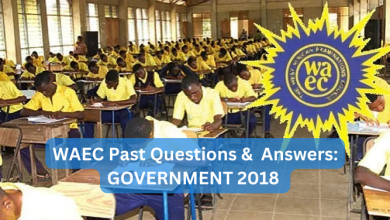WAEC Past Questions & Answer: ECONOMICS 2022

Welcome to our WAEC past question and answer series. In this post, we will be sharing Economics 2022 past questions and their answers for various subjects. Stay tuned enjoy while learning.
1. Economics is regarded as a science because?
A. its issues can be easily verified by reference to facts
B. it adopts scientific methods in making its analysis
C. its issues are relevant for national development
D. its subject matter studies human behaviour
2. The opportunity cost of a worker going to the university is
A. tuition, fees and books
B. boarding and lodging
C. the wages given up to attend the university
D. transportation and entertainment
3. Which of the following items is not an example of circulating capital
A. raw material
B. money
C. fuel
D. machinery
4. In a market economy, the problem of what goods to produced is solved primarily by
A. directives of the government
B. the pattern of consumers spending
C. producers of consumer goods
D. people producing what they want
5. If the weight of five puppies in kilograms are 3.5, 3.0, 4.2, 5.0 and 4.3, then mean weight of the puppies is?
A. 3.5 kg
B. 4.0 kg
C. 4.2 kg
D. 5.0 kg
6. If the coefficient of cross elasticity of demand for goods Y and Z is positive, the two goods are?
A. complements
B. substitutes
C. luxurious
D. inferior
7. The difference between demand and wants is in the
A. desire for the commodity
B. significance of the commodity
C. ability to pay for the commodity
D. economic value of the commodity
8. A demand curve parallel to the Y-axis indicates
A. fairly elastic demand
B. perfectly elastic demand
C. perfectly inelastic
D. fairly inelastic demand
9. Which of the following is an example of derived demand
A. textbook
B. labour
C. staple food
D. mobile phone
10. A rightward shift in the supply curve of a commodity is brought about by an increase in?
A. the level of technology
B. the price of the commodity
C. cost of production
D. taxation
11. Effective supply is the total amount of a commodity
A. from a single producer
B. in the warehouse of producers
C. offered for sale at a market place
D. produced for the market
12. Price elasticity of supply can be influenced by the following factors except?
A. time period
B. cost of production
C. size of consumer income
D. nature of the product
13. Increase in the supply of a product can be caused by?
A. change and taste and fashion of consumers
B. increase in the income of consumers
C. a fall in the cost of production
D. increase in the price of a product
14. A rational consumer will purchase a product whose price is?
A. greater than his marginal utility
B. less than his marginal utility
C. equal to his marginal utility
D. equal to his total utility
15. Parallel markets are usually the results of
A. excess supply
B. the activities of rich individuals
C. price legislation
D. inadequate information
16. Another term for equilibrium price is?
A. price floor
B. demand price
C. market clearing price
D. satisfactory price
17. When a firm is enjoying internal economies of scale, its?
A. total cost of production is increasing
B. average fixed cost is rising continuously
C. average cost of production decreases as output increases
D. average revenue and marginal revenue are decreasing
18. The specialisation of labour enhances production because people?
A. can concentrate on all goods
B. can efficiently produce their own needs
C. can save time and produce more
D. become experts in all areas of production
19. Which of the following can be added to a firm’s profit to obtain total revenue
A. total variable cost
B. total fixed cost
C. marginal cost
D. total revenue
20. The amount of money that a firm receives from the sales of its output is called
A. total profit
B. total revenue
C. total cost
D. average revenue
21. Which of the following is true of the monopolist
A. his average revenue curve is horizontal
B. He determines both price and output
C. his demand and marginal revenue curve are the same
D. he determines either price or output
22. Equity shares form the bulk of the capital of a?
A. private firm
B. public company
C. statutory company
D. limited partnership
23. If a state owned firm is sold through the stock market, the organisation becomes?
A. partnership
B. private company
C. public limited company
D. public corporation
24. The total number of people of working age who are willing and prepared to work at a given wage rate is the
A. labour force
B. supply of labour
C. demand of labour
D. occupational demand for labour
25. A civil engineer who accepts to teach elementary science in a primary school because he cannot get a paid engineering job is an example of?
A. structural unemployment
B. disguised unemployment
C. residual unemployment
D. frictional unemployment
26. Which of the following is an implication of a large population
A. decrease in crime rate
B. increase in food supply
C. decrease in standard of living
D. decrease in cost of living
27. The system of agriculture which involves the cultivation of crops and rearing of animals for family consumption only is termed?
A. peasant farming
B. plantation agriculture
C. commercial farming
D. subsistent farming
28. Which of the following is a threat to the existence of middlemen
A. consumers cooperative society
B. producers cooperative society
C. sales agents
D. large scale producers
29. Which of the following is a threat to the existence of middlemen
A. consumers cooperative society
B. producers cooperative society
C. sales agents
D. large scale producers
30. In an industrial area, the location of industries is particularly influenced by?
A. extent of the division of labour
B. external economies
C. internal economies
D. nearness to financial institution
31. Which of the following is a transfer income
A. dividends
B. rent
C. pensions
D. interest
32. The value added method used in measuring national income is to
A. measure output at factor cost
B. avoid multiple counting of output
C. deduct depreciation of capital assets
D. add net factor income from abroad
33. Which of the following is most likely to be of benefit to a debtor
A. inflation
B. deflation
C. revaluation
D. monetisation
34. A measure of the value of money in an economy is the
A. size of workers
B. general price
C. total level of savings
D. total amount of loans granted by the banks
35. One of the major functions of money is?
A. medium of exchange
B. stable in value
C. store of value
D. acceptance by the central bank
36. The function that distinguishes commercial banks from the central bank is that the former
A. is a lender of last resort
B. accepts deposits from the public
C. services the public debt
D. regulates foreign exchange
37. Direct taxes include?
A. excise duty
B. ad valorem tax
C. specific tax
D. capital gain tax
38. The control of aggregate demand through changes in government spending and tax rates is referred to as?
A. monetary policy
B. government policy
C. income policy
D. fiscal policy
39. Which of the following is not a feature of economic underdevelopment
A. monocultural economy
B. high productivity
C. low life expectancy
D. income inequality
40. One way of speeding up the economic development of a country is by encouraging
A. the consumption of consumer goods
B. early marriage
C. the importation of more consumer goods
D. savings and investment
41. Dumping in international occurs when a foreign firm sells
A. above its cost of production at home and abroad
B. below its cost of production at home and abroad
C. more goods to a country than the country has need of
D. below its cost of production in a foreign market
42. Infant industries can be described as?
A. newly established industries
B. industries enjoying tax holidays
C. industries producing baby products
D. newly commercialised industries
43. Modern international trade is based on the principle of?
A. absolute cost advantage
B. comparative advantage
C. terms of trade
D. balance of trade
44. Which of the following terms of trade is recorded in a country’s current account section of the balance of payments
A. investment income
B. foreign direct investment
C. longterm capital flows
D. long-term loans
45. One problem facing the economic integration of countries in west Africa is the
A. presence of large and developed market
B. uneven development among west African countries
C. existence of different central banks in the countries
D. fairly of labour to move freely in the country
46. One objective of organisation of petroleum exporting countries (OPEC) is to?
A. harmonize and stabilize oil prizes
B. ensure excess supply of oil to consuming countries
C. subsidise oil prices in member countries
D. assist member countries to exploit oil resources
47. Which of the following resources is renewable
A. coal
B. iron ore
C. rice
D. limestone
48. The negative effects of mining in wast Africa does not include?
A. Reforestation in rural communities
B. land degradation
C. destruction of farm lands
D. pollution of water bodies
49. The total value of goods and services produced within the borders of a country is
A. net national product
B. net domestic product
C. gross domestic product
D. gross national product
50. Which of the following factors will not underestimate the national income?
A. Rapid decrease in prices
B. Increased subsistence production
C. Practice of specialisation of labour
D. Increase in value of services not paid for
Answers To Questions
- B
- C
- D
- B
- B
- B
- C
- C
- B
- B
- C
- D
- C
- C
- C
- C
- C
- D
- D
- B
- B
- B
- C
- A
- A
- C
- D
- A
- A
- B
- C
- D
- A
- B
- A
- B
- D
- D
- B
- D
- D
- A
- B
- A
- B
- A
- C
- A
- C
- D




